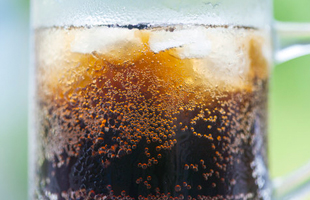
In the Western Pacific Region, childhood overweight and obesity are serious public health problems. More than 6.2 million children under 5 years of age are overweight in the Region. The prevalence of overweight among adolescents is increasing at alarming rates, reaching almost 60% in some Pacific island countries and more than 20% in some Asian countries. One in four adults in the Region is overweight. Adult obesity rates surge beyond 50% in several countries in the Pacific.
Rapid urbanization, globalization and trade liberalization have made sugar-sweetened beverages easily available, accessible and affordable. Data from Global School-Based Student Health Surveys across the Region reveal that 22–77% of adolescents reported drinking one or more carbonated soft drinks per day.
Evidence suggests that taxing sugar-sweetened beverages as part of a comprehensive approach to reduce sugar consumption has many benefits. It can encourage the consumption of healthier alternatives, improve access to healthy choices, and prevent obesity and tooth decay. However, few countries in the Western Pacific Region implement such taxes as a public health measure that also generates revenue.
To assist Member States in combating diet-related NCDs, the WHO Regional Office for the Western Pacific hosted a workshop on taxing sugar-sweetened beverages on 21 and 22 September 2016 in Manila, Philippines. The objective of the workshop was to share recent evidence and experiences on implementing taxes on sugar-sweetened beverages and to identify specific actions for the Western Pacific Region.
“The value of taxing sugar-sweetened beverages lies not only in the potential health benefits, but also the enormous revenue-raising potential...Tax revenues may be channelled for health promotion activities, potentially resulting in additional health benefits for the public,” said Dr Shin Young-soo, WHO Regional Director for the Western Pacific. He also noted that there is still work to be done to strengthen and evaluate existing policies and develop specialized tax policies especially where none yet exist.
The workshop was the first in a series of activities to support countries in the Region in advocating, developing and strengthening sugar-sweetened beverage tax policies. The participants benefited from the expertise of Dr Juan Rivera and Dr Arantxa Colchero who were instrumental in the development and evaluation of a sugar-sweetened beverage tax in Mexico that resulted in a reduction of household purchases of sugar-sweetened beverages and an increase in the purchase of healthier, untaxed alternatives such as bottled water.
Countries in various stages of development of sugar-sweetened beverage tax legislation sent delegations from their respective finance, legal and health departments to the workshop. Participants discussed strategies to develop and raise their existing tax and learnt strategies to advocate and push tax bills in their legislatures. Participants from countries that expressed interest in developing a tax benefitted from lessons on fundamental elements of fiscal policies for health and insights from countries that are progressing in the process.
Significant work for countries includes applying not only technical considerations in the selection and evaluation of sugar-sweetened beverage taxes, but also strategies to counter strong and pervasive industry opposition. Participants intend to apply
the technical skills, resource materials and ties with neighbouring country counterparts towards improved research, advocacy and development of tax policies on sugar-sweetened beverages.




